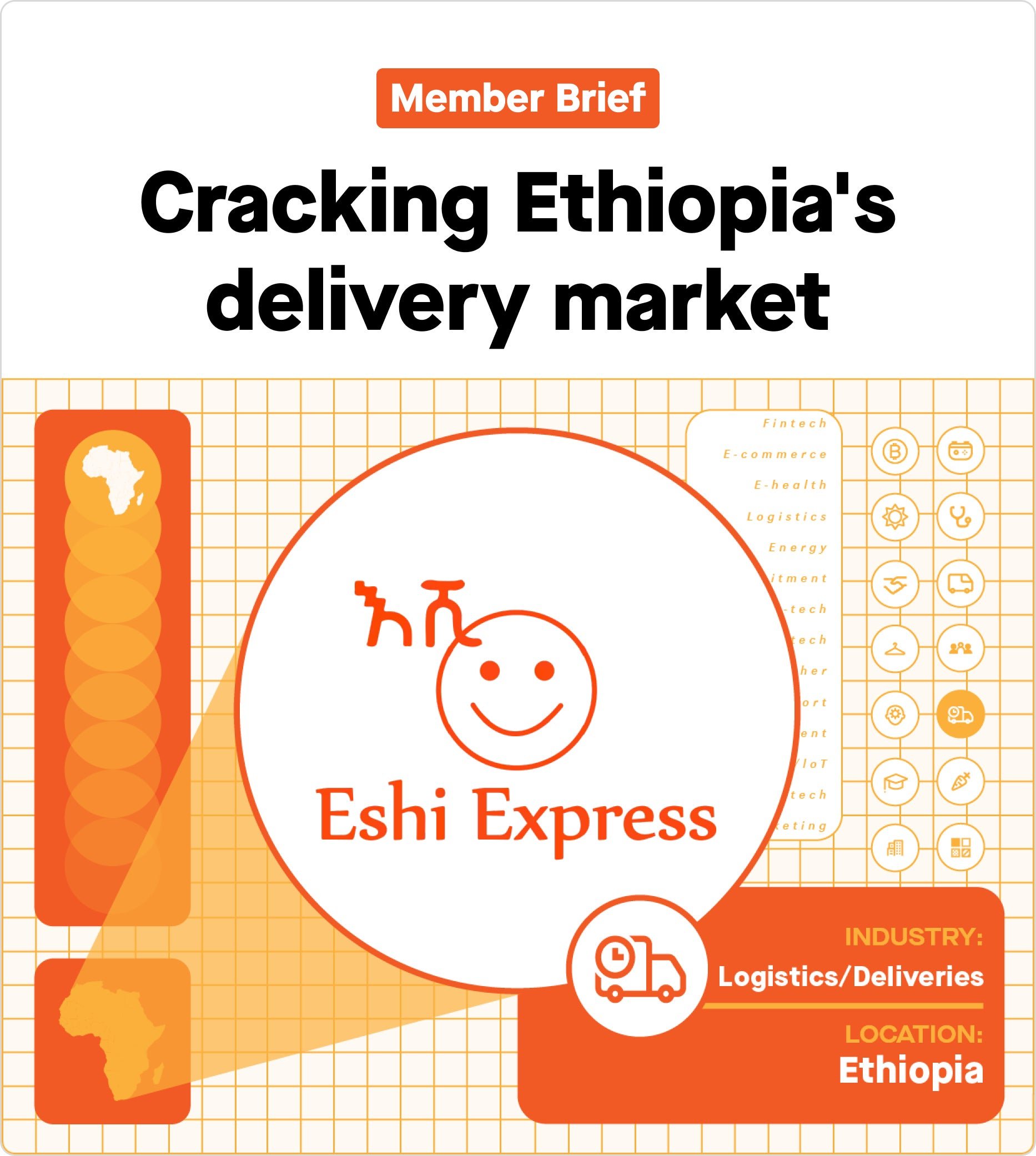✦ Cracking Ethiopia's delivery market
This email was sent later than usual due to technical issues. We apologize for the inconvenience.


This email was sent later than usual due to technical issues. We apologize for the inconvenience.
Hi Quartz Africa members,
The history of digital delivery services in Ethiopia is rather short, especially when compared to other big African economies. For a long time, web access was expensive, and internet penetration remained low across the country. Among Ethiopians, adoption of technology-enabled services remains low. And the kind of physical infrastructure such as roads and signage needed to support delivery services is rare.
When food delivery services began appearing less than a decade ago, they seemed to target the urban elite. But the delivery of goods is not a luxury, particularly in this part of the continent. Anything that people produce ultimately has to be delivered to those who consume it, so the efficiency and cost of delivery affects millions of households. In east Africa, the effective costs of transporting goods is 60% higher than in the US or Europe, making products more expensive. The cost of delivery adds to that, as it counts for about 35-55% of the product price. The global average is less than 30%.
In Ethiopia, most intra-city goods deliveries are done in-house by the manufacturing companies themselves, a time-consuming and costly enterprise. The parcel delivery sector has been dominated by large multinational logistics companies. In Ethiopia, DHL and the state-owned Ethiopian Postal Service are the prominent players.
Recently, digitization coupled with economic growth have finally given rise to several new tech-enabled delivery services in Ethiopia. Their growth has also been fueled by increasing internet penetration, urbanization, and the growth of e-commerce.
As Ethiopia adopts ambitious goals to boost its digital economy and create a favorable regulatory framework, more delivery businesses are expected to enter the market in the coming years.
Cheat Sheet
💡 The opportunity
As the world’s second-largest and second-most populous continent, Africa has a massive need for efficient goods transportation. It is also undergoing massive urbanization, which triggers additional demand for delivery services. For companies that streamline logistics with the help of technology, this is a sector of immense potential.
🤔The challenge
The rising cost of vehicles and petroleum threatens the margins of delivery services. These price increases also squeeze customers, making services more expensive than usual.
🗺 The roadmap
As logistics is an investment-intensive business, startups have to find and secure assured rounds of funding. They will also have to adapt to changing economic trends, and push prices down if necessary, to work in countries that are still not well off.
💰 The stakeholders
To avoid the volatility of fuel prices, companies have to look to sustainable mobility choices like electric vehicles. But the adoption of EVs needs a supportive regulatory environment and active government assistance.
$86.7 million: Funding secured by logistics companies in Africa in 2021
30: Active members in Ethiopia Couriers association
500 million: Increase in the number of people who are living in African cities since 1990
The case study
Name: Eshi Express
Founded: 2017
HQ: Addis Ababa, Ethiopia
Founders: Tigabu Haile, Haben Gebre
With a registered capital of 2.45 million birr ($46,000), Eshi Express was co-founded by Tigabu Haile, a law graduate, and Haben Gebre, an entrepreneur and investor. Haile was working in the non-profit sector when he noticed the demand for a reliable, affordable, and efficient courier service. It always took him days to send out invitations, and he also had to wait for gatherings to distribute published material to members.
Eshi began operating five years ago, offering three delivery option: express (within 90 minutes), same day, and next-day delivery. All products are offered for less than two dollars. So far, the company has completed 140,000 deliveries and operates a fleet of 20 vans and 60 motorcycles. It is now piloting a delivery scheme in which people deliver goods such as letters and documents by foot. 35 young people were recruited in the pilot so far.
Although Eshi accommodates individual delivery requests, companies seeking bulk deliveries make up much of their business. A huge demand is increasingly coming from the banking sector, where massive daily deliveries including documents, ATM cards are carried out. Eshi has partnered with some of the biggest private banks in Ethiopia to deliver parcels between branches. As e-commerce burgeons in Ethiopia, Eshi is also prepared to integrate its technology into vendor platforms, to deliver products that people buy online.
Eshi now delivers 200 packages a day, and has set an ambitious goal of pushing the number to 1,000 within six months.
Eshi is one of the few startups in Ethiopia that has closed funding from a local angel investor. In 2021, Eshi secured an undisclosed amount of seed funding from Addis Ababa Angels Network, a group of individual investors.
To invest in its growth, Eshi is now trying to close an additional funding round, which the founders believe will keep the company dominant in the Ethiopian market.
In conversation with

Tigabu Haile is the CEO and co-founder of Eshi Express. From managing a consortium of civil society organizations and NGOs, Tigabu vaulted into the logistics sector to found and run Eshi.
😧 On a lack of investments for Ethiopian startups:
“The [Ethiopian] economy is so wild that flipping property would provide more profit in a short time. Why would businesspeople invest in startups then? The economy has zero room for startup investment. Owing to regulations and the country’s image, international investment inflow is also low. The percentage of investment Ethiopia, the second most populous nation in Africa, receives is almost non-existent. If funding is not coming from both ways [local and foreign], I really doubt that innovative startups in Ethiopia will be able to flourish in a short time.
🤝🏽 On why he brought on a co-founder:
“I’ve run the business with a silent investor for three years. Logistics is an extremely stressful business. It’s difficult to build a very successful business solo. Investors too were urging me to bring in a cofounder. When you’re leading alone, your team will not be open to saying you’re wrong when you make a mistake. ”
🤔 On what worries him now:
“My number one worry on a daily basis right now is quality control: How we can make sure we have the system and people that can deliver what we have promised.”
Logistic deals we are 👀:
Topship, a Nigerian logistics startup secured $2.5 million in seed round in May this year. Topship handles delivery of export and import cargo, parcel, and freight to suppliers, distributors, and customers locally and internationally.
In January 2022, South African B2B delivery company, Orderin raised $4.7 million pre-series B funding. The company has raised $19.85 million in total so far.
An Egyptian parcel delivery and logistics startup, Mylerz, plans to expand across North Africa after securing $9.6 million in a funding round led by Lorax Capital Partners.
Have a highly motivated rest of your week,
—Hawi Dadhi, Addis-based Quartz Contributor
One ⛽ thing
For years Ethiopia has enjoyed some of the world’s lowest petroleum prices in the world, thanks to government subsidies. But these subsidies are going to be phased out due to the rising cost of petroleum as well as accrued government expenses. The subsidy will be fully lifted in a year for privately-owned vehicles, presenting an additional challenge to delivery companies.